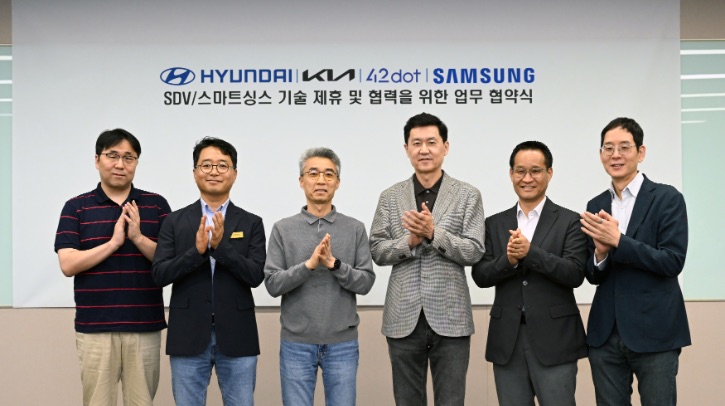Hyundai and Kia have announced a partnership with Samsung to enhance the integration of software-defined vehicles (SDVs) with smartphones.
Hyundai and Kia are working on a new generation of infotainment systems and an open mobility ecosystem, in collaboration with Hyundai’s global software center, 42dot. They aim to provide a user-centric vehicle environment to improve the connectivity of the infotainment system set to debut in 2026.
“Our goal is to enrich Hyundai Motor and Kia customers’ mobility experience by offering personalized services that extend beyond transportation, seamlessly integrating vehicles with smartphones,” said Chang Song, president and head of Hyundai Motor Group Advanced Vehicle Platform (AVP) Division.
Using Samsung’s SmartThings, Hyundai and Kia will develop technology to link SDVs and the smartphone ecosystem. By doing so, the brands aim to enrich customer mobility experiences, connecting vehicle use to smartphones and accelerating the transition to true SDVs.
“Through our collaboration with Hyundai and Kia, customers will experience the convenience of SmartThings not only at home but also in their vehicles, transcending space,” said Paul (Kyungwhoon) Cheun, president and CTO of the DX Division at Samsung Electronics and head of Samsung Research.
Hyundai, Kia and Samsung will also introduce a service for vehicle location verification. It will be expanded through integration with SmartThings Find, offering a global vehicle location tracking service. The service is made possible by a crowdsourced network of millions of Samsung Galaxy devices that use the Bluetooth Low Energy (BLE) technology to report their location, eliminating the need for cellular coverage.
This feature will allow customers to easily check their vehicle location through the Connected Car Service app in unexpected situations such as theft. Hyundai or Kia vehicles not registered with the Connected Car Service can check the location through the Samsung SmartThings app.
Hyundai Motor and Kia also plan to continuously develop services for convenient mobility by sharing vehicle data application programming interfaces (APIs) and software development kits (SDKs) with various business partners, including Samsung Electronics, through the next-generation infotainment system.



